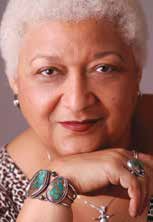
By Jewelle Gomez–
In the mid-1980s, the LGBT+ community was awakened to the horrors of a pandemic that most of the world wished to ignore. There was no Rachel Maddow showing pictures of the young gay men dying slow and horrible deaths. There was no Rachel Maddow!
Rather than seeing graphs illustrating the rising death toll, or body bags stacked in cooler trucks, we saw only what we could glimpse in our own individual corners of the world: friends being disfigured by lesions, relatives unable to breathe or who were too weak to walk, and isolated individuals sustained by visits from other friends who might soon need that same care. We saw lesbians stride into the fray with nursing and food and kindness at the level that the U.S. government could not manage.
But who was determined to spread the word as fast as the virus? Newspapers with disturbing headlines demonizing gay men to the point of creating hysteria. Living in New York City at the time, I saw people on the subway move ostentatiously away from two men who might be perceived as gay. Or take two steps back in the ticket line at the theatre, or whisper behind their hands as two men walked by. Suddenly, the only queers the public saw were not real but only carriers of a plague.
Poor science and indifference marked the early reportage about AIDS, but a group of gay men decided to do something about it by creating the organization that would become GLAAD, the Gay and Lesbian Alliance Against Defamation (https://glaad.org/). Its goal initially was to make the three major newspapers in New York City accountable for their scaremongering headlines. That was the first major success by the motley group instigated by queer film historian, Vito Russo (1946–1990), among others. I was invited to join by Vito and my work colleague, Gregory Kolovakos (1951–1990), and it was a monumental task to get the editorial boards of The New York Times, The New York Daily News, and The New York Post to sit down with a delegation of gay people to discuss press responsibility for the dread gripping the city. This remains one on the formative moments of my life as a lesbian activist—both the successful collaboration developing this organization as well as seeing the tangible effect that we accomplished.
We know that wealthy institutions have long memories because, decades later, The New York Times on August 1, 2024, launched an attack against GLAAD, now an internationally known advocacy and educational group. Starting with an alarmist headline, “Pattern of Lavish Spending,” the writer wielded shadowy figures and unsubstantiated claims to denigrate GLAAD’s Executive Director, Sarah Kate Ellis, who has most recently championed the trans community’s complaints against The New York Times coverage.
There’s not enough space here to explore all that’s wrong with the Times article and a companion hit piece in The Atlantic (dated August 12, 2024) but for a light shined on their misinformation, there’s a substantive response in The Washington Blade (https://bit.ly/4gcYTZe).
What is important for us to recognize is the familiar strategy used by the dominant culture to divide and demoralize our community. In the 1980s, it was coverage of AIDS; forty years later, it is coverage of trans people. The reasons GLAAD was created still exist, and as members of a community that is marginalized (even if more subtly now), we need to be skeptical of anyone telling us something “for our own good.”
It doesn’t matter how many queer writers are in the “writers’ room,” or how many gay secondary characters there are on television. And seeing mixed race, queer couples in television ads does not mean homophobia and racism have been conquered. GLAAD continues to be a global resource for HIV education; and it acts as a training ground for media representatives of trans and people of color.
Its most significant work right now is informing our community about the dangers of Project 2025. If a mainstream, corporate media entity—whether it’s The New York Times or Fox News—decides it doesn’t like the salary a lesbian activist receives or the budget of the queer organization she runs, we can be fairly certain it’s not because of any concern over our rights.
Jewelle Gomez is a lesbian/feminist activist, novelist, poet, and playwright. She’s written for “The Advocate,” “Ms. Magazine,” “Black Scholar,” “The San Francisco Chronicle,” “The New York Times,” and “The Village Voice.” Follow her on Instagram and Twitter @VampyreVamp
Leave Signs
Published on September 5, 2024
Recent Comments